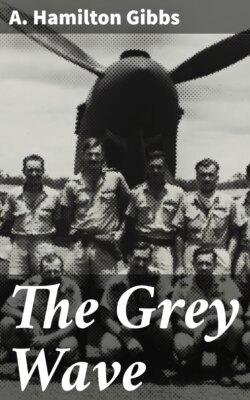Читать книгу The Grey Wave - A. Hamilton Gibbs - Страница 13
8
ОглавлениеThe evenings were the hardest part. There was only Bucks to talk to, and it was never more than twice a week that we managed to get together. Generally one was more completely alone than on a desert island, a solitude accentuated by the fact that as soon as one ceased the communion of work which made us all brothers on the same level, they dropped back, for me at least, into a seething mass of rather unclean humanity whose ideas were not mine, whose language and habits never ceased to jar upon one’s sensitiveness. There was so little to do. The local music hall, intensely fifth rate, only changed its programme once a week. The billiard tables in the canteen had an hour-long waiting list always.
The Y.M.C.A. hadn’t developed in those early days to its present manifold excellence. There was no gymnasium. The only place one had was one’s bed in the barrack room on which one could read or write, not alone, because there was always a shouting incoming and outgoing crowd and cross fire of elementary jokes and horseplay. It seemed that there was never a chance of being alone, of escaping from this “lewd and licentious soldiery.” There were times when the desert island called irresistibly in this eternal isolation of mind but not of body. All that one had left behind, even the times when one was bored and out of temper, because perhaps one was off one’s drive at the Royal and Ancient, or some other trivial thing like that, became so glorious in one’s mind that the feel of the barrack blanket was an agony. Had one ever been bored in that other life? Had one been touchy and said sarcastic things that were meant to hurt? Could it be possible that there was anything in that other world for which one wouldn’t barter one’s soul now? How little one had realised, appreciated, the good things of that life! One accepted them as a matter of course, as a matter of right.
Now in the barrack-room introspections their real value stood out in the limelight of contrast and one saw oneself for the first time: a rather selfish, indifferent person, thoughtless, hurrying along the road of life with no point of view of one’s own, doing things because everybody else did them, accepting help carelessly, not realising that other people might need one’s help in return, content with a somewhat shallow secondhand philosophy because untried in the fire of reality. This was reality, this barrack life. This was the first time one had been up against facts, the first time it was a personal conflict between life and oneself with no mother or family to fend off the unpleasant; a fact that one hadn’t attempted to grasp.
The picture of oneself was not comforting. To find out the truth about oneself is always like taking a pill without its sugar coating; and it was doubly bitter in those surroundings.
Hitherto one had never been forced to do the unpleasant. One simply avoided it. Now one had to go on doing it day after day without a hope of escape, without any more alleviation than a very occasional week-end leave. Those week-ends were like a mouthful of water to Dives in the flames of hell,—but which made the flames all the fiercer afterwards! One prayed for them and loathed them.
The beating heart with which one leaped out of a taxi in London and waited on the doorstep of home, heaven. The glory of a clean body and more particularly, clean hands. It was curious how the lack of a bath ceased after a time to be a dreadful thing, but the impossibility of keeping one’s hands clean was always a poignant agony. They were always dirty, with cracked nails and a cut or two, and however many times they were scrubbed, they remained appalling. But at home on leave, with hot water and stacks of soap and much manicuring, they did not at least make one feel uncomfortable.
The soft voices and laughter of one’s people, their appearance—just to be in the same room, silent with emotion—God, will one ever forget it? Thin china to eat off, a flower on the table, soft lights, a napkin.—The little ones who came and fingered one’s bandolier and cap badge and played with one’s spurs with their tiny, clean hands—one was almost afraid to touch them, and when they puckered up their tiny mouths to kiss one good night.—I wonder whether they ever knew how near to tears that rough-looking soldier-man was?
And then in what seemed ten heart-beats one was saying good-bye to them all. Back to barracks again by way of Waterloo and the last train at 9 p.m.—its great yellow lights and awful din, its surging crowd of drunken soldiers and their girls who yelled and hugged and screamed up and down the platform, and here and there an officer diving hurriedly into a first-class compartment. Presently whistles blew and one found oneself jammed into a carriage with about twelve other soldiers who fought to lean out of the window and see the last of their girls until the train had panted its way out of the long platform. Then the foul reek of Woodbine cigarettes while they discussed the sexual charms of those girls—and then a long snoring chorus for hours into the night, broken only by some one being sick from overmuch beer.
The touch of the rosebud mouth of the baby girl who had kissed me good-bye was still on my lips.
